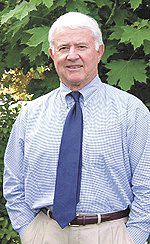The legislature is underway. We have a little new money, darn little, but enough to whet the appetite of the many departments in need. We will listen carefully. It will challenge our evaluative skills. For all its rhetoric and rummaging around, the Utah Legislature really is a very responsible body. It has managed to balance the budget and keep Utah economically sound during difficult times.
For the second year in a row, Forbes Magazine ranks Utah as the most business friendly state in the nation. The Pew Foundation in Washington D.C. continues to rate Utah the best-managed state in America. We rank near the top in every category, including quality of life. We are extraordinarily fortunate.
Over several months last summer and fall, we were engaged in the arduous task of reapportionment. New boundaries were drawn for all state house, senate, and school board seats; as well as congressional districts. The end product was structurally sound and readily defensible, with one noted exception, our boundaries were insensitive to natural borders.
Early on, I cautioned my colleagues that we would be better served with boundaries that make sense and small population variances than with absolute equality in numbers and irregular boundaries. In the end, exactness in numbers drove the ship and we ended up with irregular boundaries, which created nightmares for county clerks in designing voting precincts. They requested our help. I agreed.
This week we decided to back up and correct the problem. We remain well within a half percent variance, but we cleaned up the boundaries so they better coincide with municipal boarders and common sense divisions. It is far easier to defend this result. The numerical inexactness may trouble an accountant, but it makes sense to cowboys and judges.
As we move forward, I will try to keep you informed on some of the more interesting and important work of the session.
Both the house and the senate have approved for statewide application an adaptive testing procedure for K-11 students in public schools. It was pioneered in Utah by the Sevier School District. Education committees in both legislative bodies have also recommended appropriation of $20 million in matching funds to aid districts in acquiring the necessary hard and software for implementation of the program.
From its initial use in Sevier District in the fall of 2007, the adaptive testing program spread first to Juab, then Millard, Tooele and Uintah, followed by Alpine, Duchesne, Nebo and Weber. The State Board of Education has now added its endorsement, and if the funding is finally approved during the last week of the session, it promises to become the standard throughout Utah. Kudos to these rural districts for their leading roles.
The great strength of the adaptive testing program is its ability to provide immediate feedback on the strengths, weaknesses and individual needs of each student. It is administered three times a year-fall, winter and spring. It facilitates monitoring of personal progress and the success of corrective measures. The testing time is approximately 45 minutes and replaces standardized tests that are more disruptive of class schedule and less timely and complete in providing feedback.
Perhaps more than at any other time within our country’s history, the success of our school system at every level will determine our ability to compete nationally as well as internationally. As we import more and more goods produced abroad with inexpensive labor, there is an ever-narrowing role for the uneducated. Our commitment to and emphasis on education needs to be ratcheted-up a couple of notches if we are to maintain our station in a competitive world.
I am extremely appreciative of those who are committed to their roles as teachers in our public schools. They have gone multiple years without an increase in pay. We hope this year may be different, but any increase will likely be modest. Utah will have to continue to be the most cost-efficient system in the nation. To the teachers and administrators in our school system, I say thanks for all you do.
Legislative update from Rep. McIff

"Cutline"
